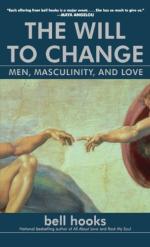These books deal explicitly with discussion about sexes, genders, sexualities, and the relationship between them all. Since I am a male, I hesitate to ascribe to myself the title of “feminist”. That movement belongs to women and is for women. However, since I promote and hope to be impacted by the operative beliefs of feminism, I titled this page as “Pro-feminist” as a way to say what I stand for and “Anti-Patriarchal” as a way to say what I stand against.
The Will to Change: Men, Masculinity, and Love by bell hooks
Currently, this is my favorite book. bell hooks may be one of the greatest thinkers of all time, and this book shows her incredible prowess. As the passionate feminist that she is, she recognizes the need for all voices to be heard. In this book, she seeks to prevent the marginalization of men, especially young boys and men of color, in feminism. Furthermore, she critiques feminist movement for promoting women to move into the powerful spheres of men without promoting men to enter into the loving community women have lived in for so long. Challenging and insightful for anyone of any gender, sex, or sexuality, this book recently started a whole new saga in my effort to be a loving, pro-feminist, anti-patriarchal male.
Getting Off: Pornography and the End of Masculinity by Robert Jensen
A must read, in my opinion, for any male who wants to engage in women’s liberation, Getting Off puts forward a pro-feminist critique of the pornography industry from a male perspective. Jensen takes his critique a step further than just pornography. His radical proposal indicts pornography as a mirror being held up to our society. Since what we see in the mirror is an explicit violence against women, Jensen claims we refuse to look at pornography with any seriousness. Conservatives write it off as not worth approaching since it is morally degrading and therefore unclean, and liberals support it as permissible since it enables women to express their sexuality. Neither group takes seriously a media that earns more annually than the mainstream movie industry! Jensen contends that this mirror shows us how masculinity demands that people with penises work within a “king of the hill” paradigm that makes women commodities to own and violate. He bases this belief on the eroticization of violence against women in popular pornographic films and genres. An industry grossing over $10 billion annually that eroticizes violence against women seems to show that masculinity, at its implicit roots, hates women. I have to agree.
The Second Shift by Arlie Russell Hochschild with Anne Machung
This book, when written and still to this day, was groundbreaking. Highly readable and well-argued, Professor Hochschild writes from the perspective of a working mom who inherited the benefits of all the hard work put in by feminist movement. Out of scholarly and personal curiosity, she sets out to discover how feminist movement affected people in their careers, marriages, and parental duties. Her findings are astonishing yet close to home. She describes in an even tenor types of familial relationships and how families manage when both parents work. Every chapter is different, so it would be hard to summarize without becoming long-winded, but a highlight of the book was definitely her discussion of family myths. These stories help excuse the activities taken by the parents in order to make them less patriarchal than they hope or more patriarchal than they think. I think this book is a must-read for everyone, and it is also the book I buy for all people I know about to enter marriage. Fantastic.
The Sexual Politics of Meat: A Feminist-Vegetarian Critical Theory by Carol J. Adams
If you ever hear me refer to meat as “slaughtered animal” (what meat actually is), blame this book. Written not from the ivory tower of academia but by an activist, educator, counselor, and direct service worker for women suffering from domestic violence, this book says what everyone knows but never admits: the regular practice of slaughtering animals makes human beings accept the slaughter of other humans, especially in the forms of violence against women. Her argument proclaims that animals, when their corpses are served on our plate, become “absent referents”. Meaning, the live animal is referred to, but she is absent. Likewise, women, when raped, sexually assaulted, or violated in any way, are referred to, albeit absently. Thus, they are “treated like a piece of meat” or “looked at like some kind of animal”. She argues that we use the same language for slaughtered animals and violated women because they in fact are the same thing: sentient beings who have been harmed, violated, killed, etc. for the sake of male power. If you read any of this book, at least read part 1.




